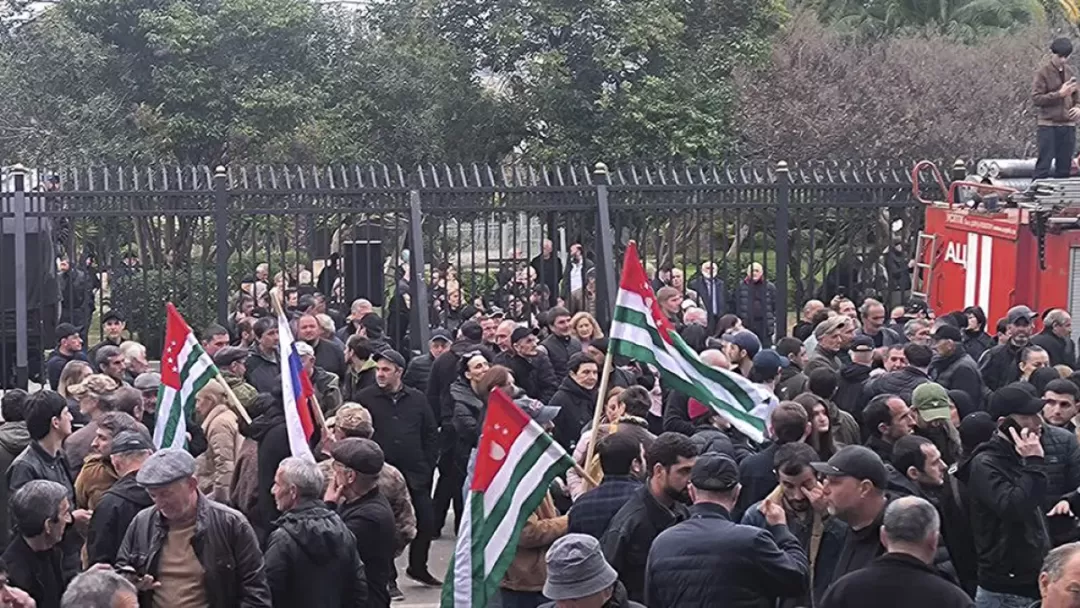
Clashes Erupt in Separatist Abkhazia Over Russian Investment Agreement

On November 15, during a session of the separatist Abkhazian parliament, [de-facto] MPs were scheduled to discuss the ratification of the intergovernmental agreement "On investment activities of Russian legal entities in the Republic of Abkhazia."
According to sources within the legislative body, this agreement faced significant opposition. The Abkhazian opposition claimed it included provisions for the construction of apartments, a bill previously rejected by parliament. Opposition groups organized protests outside the parliament building in Sokhumi to express their dissatisfaction.
The authorities took strict security measures, surrounding government buildings with heavy defenses and military trucks blocking entrances. However, the parliamentary agenda to consider the agreement was not approved. Parliament Speaker Lasha Ashuba proposed postponing the session, citing pressure faced by deputies regarding the ratification. The proposal was accepted, with only 21 out of 35 MPs present in the session hall. Ashuba stated that some MPs refused to work under such conditions.
Outside the parliament, opposition supporters demanded a vote against the agreement and began tearing down fences guarded by Defense Ministry vehicles. A scuffle broke out when protesters rammed the barriers, pelting law enforcement officials with stones and sticks. Protesters eventually entered the parliament premises. Opposition groups also called for the resignation of [the separatist] President Aslan Bzhania, accusing him of using Russian-Abkhazian relations for personal gains. In a statement, opposition leaders asserted their protest was not against Russia but aimed at protecting Abkhazia’s national interests, natural resources, and sovereignty.
On November 16, [the de-facto] President Aslan Bzhania refused to withdraw the draft law on ratification from parliament. Speaking from his native village of Tamysh, Bzhania expressed his willingness to announce new presidential elections and resign if the opposition vacated seized government buildings. “If we do not return the process to the legal course, it will be very difficult to ensure the preservation of the state,” Bzhania stated. He rejected allegations of fleeing to a Russian military base, affirming his presence in Abkhazia.
Opposition leaders accused Bzhania of attempting to suppress public discontent while claiming support from segments of law enforcement. They also began dismantling the fence surrounding government buildings, leaving a section as a symbolic reminder to future leaders about staying connected with the people. Protesters returned Defense Ministry trucks used during the protests to their original posts, declaring such equipment should not be used for internal conflicts.
In an interview on November 17, Bzhania described the opposition’s actions as an attempted coup d’état and urged citizens to avoid participating in unauthorized rallies. “Our homeland is in such a difficult situation as a result of the actions of people who attempted a coup d’état. It’s not too late to get everything back,” Bzhania emphasized. He suggested that presidential elections would provide a resolution to the crisis, allowing the people of Abkhazia to decide their leadership.
See Also


Armenia Records 5.9% GDP Growth in 2024, Missing 7% Goal

Yerevan Balances Strategic Ties with Both US and Russia, Says Foreign Minister

FM Mirzoyan: Peace Deal with Azerbaijan Is Within Reach

Pashinyan and Erdogan Hold Call, Reaffirm Commitment to Ongoing Dialogue

